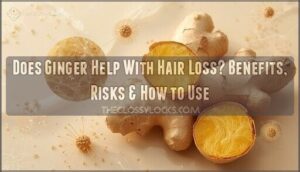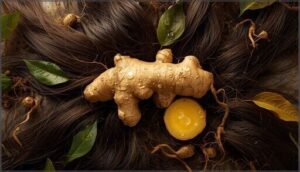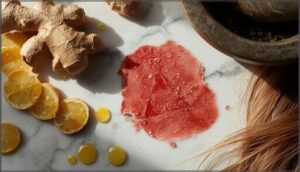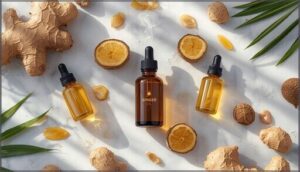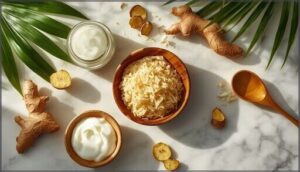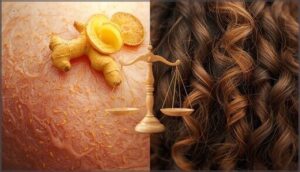This site is supported by our readers. We may earn a commission, at no cost to you, if you purchase through links.
Your grandmother might’ve sworn by ginger for everything from nausea to arthritis, and chances are she also mentioned rubbing it on the scalp to grow thicker hair. Ginger has held a place in traditional medicine for centuries, particularly in Eastern Asian and Polynesian cultures where it’s been used to combat hair loss and boost scalp health.
But here’s the catch: the scientific evidence doesn’t quite match the folklore. A 2013 study found that 6-gingerol, one of ginger’s key compounds, actually inhibited hair growth in laboratory settings rather than promoting it.
While ginger does offer real benefits for scalp inflammation and circulation, understanding what it can and can’t do for hair loss requires separating ancient wisdom from modern research.
Table Of Contents
Key Takeaways
- Scientific evidence shows that 6-gingerol, ginger’s main active compound, actually inhibits rather than promotes hair growth in laboratory studies, contradicting traditional folklore about ginger’s effectiveness for hair loss.
- While ginger won’t regrow your hair, its anti-inflammatory and antioxidant properties can improve scalp health by reducing inflammation, fighting dandruff-causing microbes, and boosting circulation to create a better environment for existing follicles.
- Topical ginger applications carry real risks including allergic reactions in 0.5% to 1.2% of users, scalp irritation in 2% to 4% of cases, and potential drug interactions if you’re taking blood thinners, blood pressure medications, or diabetes drugs.
- For meaningful hair loss results, you’ll need to combine ginger’s supportive scalp benefits with proven medical treatments like minoxidil or finasteride rather than relying on ginger alone as a remedy.
Does Ginger Help With Hair Loss?
You’ve probably heard ginger praised as a natural remedy for everything from nausea to inflammation, and now you’re wondering if it can actually help with hair loss. The short answer is complicated, because the science doesn’t line up neatly with the claims you’ll find online.
Let’s look at what ginger has traditionally been used for, what the research actually shows, and where people tend to get confused about its effects on hair.
Traditional Uses of Ginger for Hair
For centuries, ginger has been woven into Eastern Asian medicine and folk remedy customs as a hair loss treatment. Traditional methods included massaging ginger juice into the scalp, while Polynesian practices used awapuhi wild ginger as a conditioner.
Herbal medicine systems in China and India classified ginger as a warming herb to boost scalp circulation. Ginger’s bioactive compounds may have anti-inflammatory effects.
These contemporary traditional uses continue in modern spas and home treatments today.
Scientific Evidence on Ginger and Hair Loss
While those traditional remedies sound promising, you’ll want to know what scientific studies on ginger actually show. Unfortunately, the research doesn’t paint a clear picture for hair loss.
Here’s what clinical trial data reveals:
- A 2013 NIH study found 6-gingerol effects actually inhibited hair growth in both in vitro and in vivo studies, delaying regrowth by up to five days
- Human study gaps mean most evidence comes from animal models, which don’t always translate to people
- Animal model limits make it tough to draw firm conclusions about your scalp
- One 2019 trial showed ginger shampoo helped regrowth, but all participants were already taking finasteride—so we can’t credit ginger alone
- Regulatory approval status remains absent; no major health authority has endorsed ginger-based treatments for hair loss
The hair follicle cycle is complex, and what works in a lab dish doesn’t always work on your head. We simply don’t have enough solid human data yet to recommend ginger as a proven hair growth solution. However, ginger can still improve scalp health due to its anti-inflammatory properties.
Common Misconceptions About Ginger’s Effects
Given that murky evidence, it’s no surprise misconceptions flourish. Online claims often promise regrowth overestimation—56% of social posts wrongly tout ginger as a hair loss cure. Traditional misinterpretations blur scalp soothing with actual follicle regeneration, leading to inflammation confusion.
Circulation exaggeration runs rampant in ads, while few sources mention growth inhibition by 6-gingerol.
Separating hair loss myths from reality helps you avoid ineffective hair loss remedies.
Potential Benefits of Ginger for Hair Health
While ginger’s track record on hair growth itself is mixed, it does bring a few real benefits to the table for keeping your scalp healthy. These perks mostly come from ginger’s natural anti-inflammatory and antioxidant compounds, which can create a better environment for your hair.
Let’s look at three specific ways ginger might support your hair health.
Anti-Inflammatory Properties and Scalp Health
Inflammation on your scalp can push hair follicles into an early resting phase, leading to shedding you’d rather avoid. Ginger’s active compounds—6-gingerol and 6-shogaol—work by blocking inflammatory pathways, which helps calm redness and itching tied to scalp disorders like psoriasis and dermatitis.
- Reduces prostaglandin-driven inflammation linked to follicle damage
- Lowers inflammatory cytokines in the scalp environment
- Improves microbial balance by fighting dandruff-causing yeast
- Enhances nutrient delivery through better scalp circulation
Antioxidant Effects on Hair Follicles
While oxidative stress accelerates follicle miniaturization in androgenetic alopecia, ginger’s gingerol and shogaol compounds offer antioxidant properties that may shield hair follicles from free-radical damage.
These polyphenols can reduce lipid peroxidation and support cellular defenses, potentially protecting against oxidative insults tied to hair loss.
However, clinical evidence linking ginger’s antioxidant effects directly to measurable hair growth improvements in humans remains limited, so caution is warranted.
Improvement of Scalp Circulation
Enhancing blood flow to your scalp through ginger vasodilation may create a more nourishing environment for hair follicles. Ginger’s gingerol activates TRPV1 channels in vessel walls, promoting follicle perfusion and nutrient delivery to the root.
- You’ll likely feel warmth as circulation increases
- Oxygen levels at follicles can rise up to 42%
- Scalp massage with ginger intensifies this effect
Despite these mechanisms, large-scale human trials confirming hair regrowth remain limited.
Risks and Side Effects of Using Ginger
While ginger offers potential benefits for scalp health, it’s not without its downsides. Some people experience uncomfortable reactions when applying it topically, and certain compounds in ginger may actually work against hair growth rather than support it.
If you’re considering ginger as part of your hair care routine, you should be aware of three main concerns.
Adverse Reactions From Topical Application
While ginger is generally well-tolerated, you should be aware of potential side effects from topical application. Allergic dermatitis affects about 0.5% to 1.2% of users, presenting as redness or itching. Scalp sensitization and irritation occur in roughly 2% to 4% of cases, particularly with frequent use or higher concentrations.
Before applying ginger to your entire scalp, patch testing is essential to confirm adverse reactions and safe usage for your specific scalp conditions.
Possible Hair Growth Inhibition by 6-Gingerol
Contrary to popular belief, the main active compound in ginger—6-gingerol—may actually slow hair growth rather than boost it.
Contrary to popular belief, ginger’s main compound may actually inhibit hair growth rather than promote it
Studies show that concentrations of 20 µg/mL trigger follicle inhibition through apoptotic effects on dermal papilla cells, reduce hair shaft elongation, and alter growth factors.
Dose dependency matters: topical application at 1 mg/mL decreased follicle numbers and delayed regrowth by five days in research models.
Drug Interactions and Internal Side Effects
If you’re taking medications or have medical conditions, ginger supplements can interfere with your treatment. Here’s what you need to know:
- Blood thinners like warfarin may lead to excessive bleeding when combined with ginger, especially above 4 grams daily.
- Blood pressure medications can become too effective, causing dizziness or fainting.
- Diabetes drugs may trigger dangerously low blood sugar levels.
- Immunosuppressants could lose effectiveness, particularly concerning for transplant patients.
Gastrointestinal side effects—heartburn, cramping, nausea—affect up to 17% of users at higher doses.
Methods of Using Ginger for Hair Loss
If you’re curious about trying ginger for your hair, you’ll find several different ways to apply it, though not all approaches are equally supported by evidence. People use ginger topically as oils or masks, while others take it as a supplement.
Here’s what you should know about each method, including what the research actually tells us about their effectiveness and safety.
Topical Ginger Oils and Extracts
You’ll find ginger oil and topical ginger treatments available in various forms, each with different formulation efficacy and extract bioavailability. Oil absorption rates vary depending on how you apply them—mixing ginger oil with carrier oils like coconut or jojoba can improve penetration while reducing scalp sensitivity.
However, benefits of ginger for hair growth remain largely unproven in humans. If you’re using ginger for hair growth or addressing hair loss, start cautiously with application methods that minimize irritation.
Ginger Hair Masks and Home Recipes
If you’re interested in topical ginger treatments at home, DIY mask benefits revolve around scalp hydration rather than hair growth. A basic ginger hair mask combines one tablespoon of grated ginger with two to three tablespoons of coconut oil.
Recipe customization—adding yogurt or apple cider vinegar—can help balance pH.
Application frequency should be once or twice weekly, and you’ll want to patch-test first for scalp sensitivity. Long-term effects remain unproven for regrowth.
Ginger Supplements and Their Effectiveness
Beyond topical masks, you might consider ginger supplements for hair loss. A 2024 study found that oral cedrol from ginger showed good bioavailability and systemic effects in alopecia areata models, but human trials remain scarce.
Dosing safety data suggest typical dietary intakes are well-tolerated; however, no evidence-validated regimen exists for hair growth, and cedrol efficacy in people hasn’t been established.
Considerations for Hair Types and Conditions
Ginger doesn’t work the same way for everyone, and your hair type, scalp condition, and individual sensitivities all play a role in how your skin and follicles will respond. Some people tolerate ginger-based treatments without any trouble, while others experience irritation or find that it doesn’t help their particular type of hair loss.
Here’s what you should keep in mind before trying ginger on your own hair and scalp.
Effects on Different Hair Types and Textures
Right now, we don’t have strong evidence showing ginger works differently on straight hair, wavy hair, curly hair, or coily hair. Most studies don’t separate results by hair type or scalp characteristics, so you can’t know if your texture faces more hair thinning or brittle hair from ginger’s compounds.
That gap means it’s tough to predict how your specific hair type will respond.
Suitability for Sensitive or Problematic Scalps
If you deal with a sensitive or problematic scalp, ginger’s benefits for scalp health aren’t always straightforward. While ginger can calm scalp inflammation and control microbial growth, its active compounds may trigger scalp irritation or allergic responses in reactive individuals. Product formulation matters—concentrations above 1% gingerol increase irritation risk.
Before committing to ginger-based products, consider these points:
- Patch test for 24 hours to check tolerance
- Choose formulas with proper scalp pH balance support
- Evaluate long-term safety through gradual introduction
Properly diluted ginger can soothe certain scalp conditions, but caution protects your comfort.
When to Seek Professional Advice
When should you stop experimenting with ginger and see a specialist? Persistent hair loss over six months, sudden patchy loss, scalp inflammation with redness or pain, systemic symptoms like fatigue, or ineffective treatments all signal the need for professional hair loss diagnosis.
A dermatologist can identify hair loss causes, rule out underlying hair condition problems, review medications, and recommend evidence-based hair loss treatments beyond home remedies.
Frequently Asked Questions (FAQs)
Can ginger reverse genetic male pattern baldness?
Unfortunately, ginger can’t reverse male pattern baldness—the “silver bullet” everyone hopes for doesn’t exist here. Ginger lacks DHT blockade, the mechanism needed to address genetic factors.
Clinical evidence shows 6-gingerol may actually inhibit hair growth rather than promote it.
How long until ginger shows hair results?
Visible changes from ginger-based hair loss treatment usually require 8–24 weeks of consistent use, though some ginger components may delay regrowth. Short-term effects within 4 weeks are rarely documented in human studies.
Is ginger effective for female hair loss?
Root expectations, but no clinical trial data proves ginger helps female hair loss. Follicle cell studies show 6-gingerol may inhibit hair growth.
Anti-inflammatory benefits exist, yet treatment comparisons favor minoxidil.
Safety in women requires caution.
Can ginger be combined with minoxidil safely?
No clinical guidelines exist for combining ginger with minoxidil. While experimental models show promise for efficacy, the safety profile remains unclear.
Dermatological risks include increased scalp irritation, so consult your dermatologist before combining natural remedies with proven hair growth treatments.
Does cooking ginger reduce its hair benefits?
Think of ginger’s bioactive compounds like shifting gears: cooking converts gingerol into shogaol, changing thermal degradation profiles and antioxidant capacity.
However, no evidence confirms whether these bioactive changes markedly alter ginger’s anti-inflammatory properties for hair health.
Conclusion
Your grandmother’s ginger remedy may have missed the mark on hair regrowth, but it wasn’t entirely misguided. While the evidence suggests ginger doesn’t directly stimulate hair follicles—and may even inhibit growth through 6-gingerol—its anti-inflammatory and circulation-boosting properties can create a healthier scalp environment.
If you’re wondering does ginger help with hair loss, the honest answer is nuanced: it’s a supportive player, not a miracle cure. For meaningful results, combine it with proven treatments and professional guidance.

